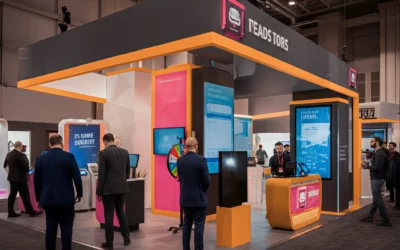There’s an old commercial from the 80s for Reese’s Peanut Butter Cups that’s posted on Youtube. In it, a young woman is walking down a street with an open jar of peanut butter (because people often walk around town eating peanut butter straight from the jar). Walking right toward her is a young man holding a large chocolate bar. Well wouldn’t you know it, they run smack into each other, and the chocolate bar falls right into the jar of peanut butter. The commercial would have us believe that one of the most popular candies in the world was born out of a happy accident.
So what does any of this have to do with hybrid events?
Well, you could say the popularity of hybrid events also grew out of an accident, or to be more specific, grew out of a global pandemic. Covid 19 has required event planners to pivot and create events that are not only informative and engaging for audience members, but also safe. Hybrid events, events that incorporate both in-person and virtual, live-streaming elements, tick all of those boxes. And while the world has already begun to slowly open back up and return to normal, many in the industry suggest that hybrid events are here to stay.
Consider this: in an informal survey held during a Global Meeting Industry Day in April, 62% of event planners said the future of events is hybrid. Could it be the pandemic has forced us to embrace something that just happens to offer a ton of benefits we never paid attention to before?
5 Benefits of Hybrid Events
The most obvious benefit of hybrid events is that they allow event planners to hold an event while still adhering to social distancing rules. But that’s just the tip of the proverbial iceberg! Here are 5 more benefits that hybrid events offer:
1. Increased Reach & Attendance
Hybrid events allow planners to increase their reach and gain more attendees. In many cases, planners can gain attendees that aren’t interested in in-person events. These people often don’t understand the value of going in person and/or there are geographical restrictions that don’t allow travel. So hybrid events allow planners to attract the kinds of people that ordinarily wouldn’t have been interested in a live event in the first place.
2. Increased Engagement
How engaging an event is will ultimately determine its success. Hybrid events allow planners to combine virtual events with their live events, thereby opening up numerous opportunities to increase engagement. Whether it’s through a mobile device or a computer, attendees of hybrid events can consume content, interact, like and share events all with the click of a button.
Many virtual event platforms also offer tools to help engage virtual audiences. Planners have the option of holding virtual Q&As as well as creating virtual networking opportunities.
3. Reduced Environmental Impact
You’ve probably heard that one of the greatest benefits of the global pandemic was that carbon emissions decreased significantly worldwide. Empty streets and reduced air travel during the height of the lock down saw our air quality like it hasn’t been in decades! Hybrid events encourage green thinking and the reduction of personal carbon footprints, both of the brand’s ambassadors and the attendees.
4. Decreased Costs
Live in-person events cost more to produce. There is the expense of the venue. How many conference rooms are needed to host an event for 500 people? Think accommodations and travel costs as well.
Hybrid events can significantly decrease costs for everyone involved. Having some of your speakers present from home means less need for hotel rooms and airfare. Having a good portion of the audience attend virtually means less need for conference space, breakout rooms, food and beverages etc. Using a plug and play studio that can be taken to any location means you can broadcast and manage the virtual portion of your event without the need or expense of an entire team of tech experts.
The bottom line is, for many businesses who find themselves working with far smaller budgets post-Covid than they had pre-Covid, hybrid events are an effective way to bridge the gap between costs and outcomes.
5. Data Collection
Perhaps one of the biggest benefits of hybrid events is that they allow you to collect actionable data. At an exclusively in-person event, about the most data you can collect is taking note of how many attendees showed up and participated in each session, such as a Q&A session. That’s not a lot of information and it’s not really going to help you plan an even BETTER event in the future.
Conversely, hybrid events provide planners with data like exactly how many people participated in an event, how engaged they were, and who potentially dropped out of a session and why. These metrics are valuable because they actually help planners refine and improve content and engagement strategies moving forward.
Accidents happen. And unfortunately, so do global pandemics. But when you consider all of the benefits gained, it’s hard not to think of hybrid events as a delicious outcome.
If you need help planning your next hybrid event, click here to start a conversation with us!
You might also like…
Top 10 U.S. Meeting Destinations for 2026
Successful corporate events don’t just happen — they’re built on smart decisions, starting with...
The Trade Show Prep Guide: Boost ROI Like a Pro
Trade shows are a powerful way to elevate your brand's visibility, connect with potential...
President’s Club 2026 Ultimate Gift Guide
Luxury, Personalization, and Impact for Unforgettable Incentive Travel President’s Club isn’t just...




